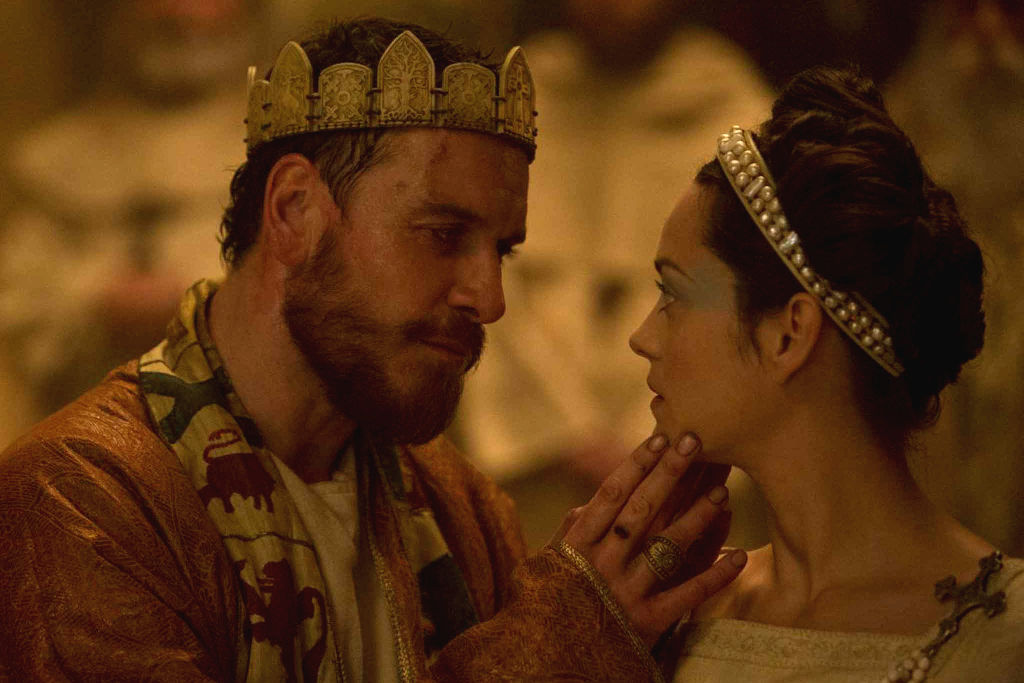Review: The Latest Iteration Of ‘Macbeth’ Finally Breaks The Big Screen Curse Of The Scottish Play
All filmic adaptations of The Tragedy Of Macbeth have existed in the shadow of Roman Polanski’s towering achievement. But Justin Kurzel’s attempt, starring Michael Fassbender, comes pretty damn close.

Since 1971, all filmic adaptations of The Tragedy Of Macbeth have existed in the shadow of Roman Polanski’s towering achievement.
There have been misfires in attempts to either modernise or relocate the events of “the Scottish play”; witness Geoffrey Wright’s regrettable Melbourne gangland adaptation of 2006, with its sexy schoolgirl Witches and Sam Worthington wondering blankly if that is a dagger he sees before him. It is, despite the obvious quality of the source material, very easy to fuck up Shakespeare.
How thrilling, then, that Justin Kurzel’s Macbeth — as alive and unrelenting a Shakespeare adaptation as we’ve seen in decades — comes so close to leaving Polanski’s work in its dust.
Taking A Broadsword To The Text
Working from a screenplay by Jacob Koskoff, Todd Louiso and Michael Lesslie, this is a bracing excoriation of the text in which only the visceral essentials remain.
The film begins with the image of a dead child: the issue, we are led to assume, of Macbeth (Michael Fassbender) and his wife Lady Macbeth (Marion Cotillard), who attend the tiny body along with a brace of mourners.
It’s one of the last peaceful moments in the film, which immediately after pitches the viewer onto the battlefield, as Macbeth leads an assault against the traitorous Macdonwald’s army; a battle, in stage productions, that occurs prior to the events of the play. And if the rest of the film doesn’t match that battle’s intensity until the final showdown, the impact of the bloodshed — interspersed as it is with moments of gloriously gory slow motion — sets the uncompromising tone.
Shortly after, Macbeth and Banquo (Paddy Considine) bear witness to the Witches’ prophecy: Macbeth is soon to be elevated to Thane of Cawdor, and thereafter, king. Fassbender and Considine play the scene (as they do the entire film) with an exhilarating naturalism, the latter offering his explanation — “The Earth hath bubbles, as the water has, and these are of them” — with blunt bewilderment.
(The “weird sisters” here seem almost to be suffering from PTSD, such is their mysterious flat affect.)
Sure enough, the good King Duncan (David Thewlis) sends word to a baffled Macbeth that he is, indeed, the new Thane of Cawdor. The Macbeths, alarmed and yet also buoyed by the emerging events, welcome Duncan for a celebration at Inverness. What could possibly go wrong?
The Finest Cast Of Players
What happens next shouldn’t be news to anyone even casually familiar with the play, but the way in which Kurzel and his collaborators unfold the tragedy is bracingly fresh; Birnam Wood’s arrival at Dunsinane is an additionally artful spin on the play that, in the manner of Macduff’s birth, arguably invented the twist ending.
The supporting cast is uniformly fine, from Thewlis’ almost beatific Duncan and Jack Reynor’s clear-hearted Malcolm, to Sean Harris’ uncompromising Macduff, who in grief reveals the depth of his feeling, and Considine’s soulful Banquo. Even young Lochlann Harris, as Fleance, is terrific.
In Fassbender’s hands, the brief glimpse of Macbeth’s mourning and his skill in leading his army make the Thane’s unravelling all the more affecting; with those details typically absent from the narrative, the eponymous character is often portrayed as somehow ‘bad to the bone’, which strips the play of its emotional heft. Here, the gradual draining of his “milk of human kindness” is a true tragedy. In an elegant performance, Fassbender moves expertly between the vernacular of the stripped-back text and the remaining moments of poetry.
Cotillard plays Lady Macbeth as a woman consumed by grief, her French accent suggesting an outsider status among the courtiers that makes the loneliness of her descent all the more poignant. Where other interpretations of the role project Lady Macbeth’s soliloquy to the rafters, Cotillard’s sleepwalk (“To bed. To bed.”), from a snowflake-flecked chapel to the thankless moors outside, is devastating in its quietness; “she who had seemed so remorseless seems to have been borne down by remorse,” as Sigmund Freud put it. In this way it is a newly definitive performance.
Full Of Sound And Fury

The performances in Macbeth are stunning, as are the visuals that surrounds them.
Cinematographer Adam Arkapaw captures a barren, imposing Scotland that looms around the players like an existential nightmare; it’s equal parts Bergman and Highlander. Some of the imagery — frightened horses whipped by night-time rain; blood falling slowly from a sword mid-battle; some judicious use of blood red filters — is almost incomprehensibly good.
And inside the tents and castles, what riches Arkapaw has to capture, between Jacqueline Durran’s costumes and Fiona Crombie’s production design, all carved bone and textured cloths.
Jed Kurzel’s otherworldly score is aided by unnerving sound design, a hallmark of his brother Justin Kurzel’s work when you consider the role it played in his masterpiece, Snowtown (Tara Judah wrote expertly about that film’s “aural association and sensory affect” last year).
The first time I saw Macbeth, in a special last-minute-arrangement screening at this year’s Melbourne International Film Festival, I came away captivated by its imagery but not certain it was in the same league as Polanski’s and Akira Kurosawa’s interpretations of the play.
Upon second viewing, better able to sink into the film freed from the weight of expectation, any reservations melted as breath into the wind. This Macbeth is a magnificent tragedy, and with it Kurzel stakes his claim as one of the most exciting directors working today.
–
Macbeth is released in Australian cinemas today.
–
Clem Bastow is an award-winning writer and critic with a focus on popular culture, gender politics, mental health, and weird internet humour.She’s on Twitter at @clembastow